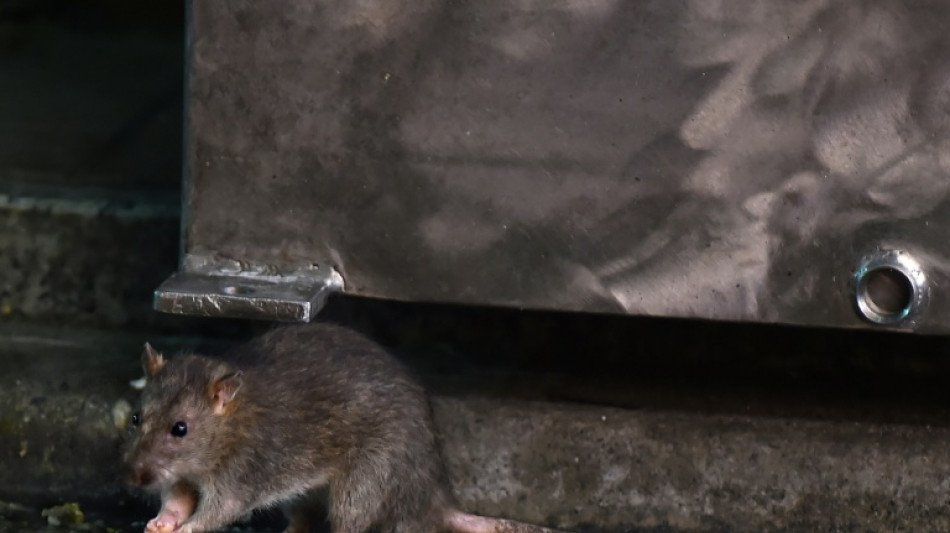
-
 Australian tennis star Purcell provisionally suspended for doping
Australian tennis star Purcell provisionally suspended for doping
-
Asian markets track Wall St rally as US inflation eases rate fears

-
 Luxury Western goods line Russian stores, three years into sanctions
Luxury Western goods line Russian stores, three years into sanctions
-
Wallace and Gromit return with comic warning about AI dystopia

-
 Philippine military says will acquire US Typhon missile system
Philippine military says will acquire US Typhon missile system
-
Afghan bread, the humble centrepiece of every meal

-
 Honda and Nissan expected to begin merger talks
Honda and Nissan expected to begin merger talks
-
'Draconian' Vietnam internet law heightens free speech fears

-
 Israeli women mobilise against ultra-Orthodox military exemptions
Israeli women mobilise against ultra-Orthodox military exemptions
-
Asian markets track Wall St rally as US inflation eases rate worries

-
 Tens of thousands protest in Serbian capital over fatal train station accident
Tens of thousands protest in Serbian capital over fatal train station accident
-
Trump vows to 'stop transgender lunacy' as a top priority

-
 Daniels throws five TDs as Commanders down Eagles, Lions and Vikings win
Daniels throws five TDs as Commanders down Eagles, Lions and Vikings win
-
'Who's next?': Misinformation and online threats after US CEO slaying

-
 Only 12 trucks delivered food, water in North Gaza Governorate since October: Oxfam
Only 12 trucks delivered food, water in North Gaza Governorate since October: Oxfam
-
InterContinental Hotels Group PLC Announces Transaction in Own Shares - December 23

-
 Melrose Group Publicly Files Complaint to the Ontario Securities Commission
Melrose Group Publicly Files Complaint to the Ontario Securities Commission
-
Langers edge Tiger and son Charlie in PNC Championship playoff

-
 Explosive batsman Jacobs gets New Zealand call-up for Sri Lanka series
Explosive batsman Jacobs gets New Zealand call-up for Sri Lanka series
-
Holders PSG edge through on penalties in French Cup

-
 Slovak PM Fico on surprise visit to Kremlin to talk gas deliveries
Slovak PM Fico on surprise visit to Kremlin to talk gas deliveries
-
Daniels throw five TDs as Commanders down Eagles

-
 Atalanta fight back to take top spot in Serie A, Roma hit five
Atalanta fight back to take top spot in Serie A, Roma hit five
-
Mancini admits regrets over leaving Italy for Saudi Arabia

-
 Run machine Ayub shines as Pakistan sweep South Africa
Run machine Ayub shines as Pakistan sweep South Africa
-
Slovak PM Fico on surprise visit to Kremlin

-
 Gaza rescuers say Israeli strikes kill 35
Gaza rescuers say Israeli strikes kill 35
-
'Incredible' Liverpool must stay focused: Slot

-
 Maresca 'absolutely happy' as title-chasing Chelsea drop points in Everton draw
Maresca 'absolutely happy' as title-chasing Chelsea drop points in Everton draw
-
Salah happy wherever career ends after inspiring Liverpool rout

-
 Three and easy as Dortmund move into Bundesliga top six
Three and easy as Dortmund move into Bundesliga top six
-
Liverpool hit Spurs for six, Man Utd embarrassed by Bournemouth

-
 Netanyahu vows to act with 'force, determination' against Yemen's Huthis
Netanyahu vows to act with 'force, determination' against Yemen's Huthis
-
Mbappe back from 'bottom' as Real Madrid down Sevilla

-
 Ali hat-trick helps champions Ahly crush Belouizdad
Ali hat-trick helps champions Ahly crush Belouizdad
-
France kept on tenterhooks over new government

-
 Salah stars as rampant Liverpool hit Spurs for six
Salah stars as rampant Liverpool hit Spurs for six
-
Syria's new leader says all weapons to come under 'state control'

-
 'Sonic 3' zips to top of N.America box office
'Sonic 3' zips to top of N.America box office
-
Rome's Trevi Fountain reopens to limited crowds

-
 Mbappe strikes as Real Madrid down Sevilla
Mbappe strikes as Real Madrid down Sevilla
-
'Nervous' Man Utd humiliated by Bournemouth

-
 Pope again condemns 'cruelty' of Israeli strikes on Gaza
Pope again condemns 'cruelty' of Israeli strikes on Gaza
-
Lonely this Christmas: Vendee skippers in low-key celebrations on high seas

-
 Troubled Man Utd humiliated by Bournemouth
Troubled Man Utd humiliated by Bournemouth
-
2 US pilots shot down over Red Sea in 'friendly fire' incident: military

-
 Man Utd embarrassed by Bournemouth, Chelsea held at Everton
Man Utd embarrassed by Bournemouth, Chelsea held at Everton
-
France awaits fourth government of the year

-
 Germany pledges security inquest into Christmas market attack
Germany pledges security inquest into Christmas market attack
-
Death toll in Brazil bus crash rises to 41


Much-maligned rats unlikely to spark next pandemic: study
Rats have been seen as filthy disease-spreaders since at least the time of the plague, but new research shows that rodents and other city-dwelling animals are less likely to cause the next pandemic than previously thought.
Researchers at Georgetown University in Washington DC studied data on about nearly 3,000 mammals, expecting to find that those living in urban environments hosted more viruses that could be caught by humans, because they were in such close contact.
They found that urban animals did in fact carry 10 times as many kinds of disease -- but also that more than 100 times as many studies had been published about them.
When the researchers corrected for this massive bias -- a long-standing scientific preference to study animals scuttling under our feet rather than hiding in rainforests -- they were surprised to find that rats were no more likely to be the source of a new human disease than other animals.
However, "it's still not good idea to get too close and friendly to urban wildlife," said Greg Albery, a disease ecologist who led the study published in the Nature Ecology and Evolution journal on Monday.
"These urban animals are unlikely to be the source of the next 'Disease X', but they're still often a source of well-known important diseases," he told AFP, giving the example of leptospirosis, a bacterial disease commonly spread by rats.
The threat from another common target of city disdain -- the pigeon -- was "almost certainly" also exaggerated due to research bias, he said.
Because we have been studying animals living in cities for so long, "we know so much about their parasites that there are relatively few unknowns there; rural wildlife is much more uncertain and more likely to provide us with the next 'Big Threat'."
Jonathan Richardson, a professor of urban ecology at the University of Richmond, said it was an important study because the authors "rightfully highlight the over-representation of data coming from urban mammal research".
But he told AFP that it is still fair to describe rats as "disease sponges" because humans are in such regular contact with them.
Richardson said his research has found that urban rats harbour more than 200 pathogens and parasites that could jump over to humans, while nearly 80 percent of rats in some cities carry leptospirosis.
- 'Important pathway into humans' -
Albery and his study co-author Colin Carlson published research last week showing climate change could increase the risk of new epidemics.
They found that as animals like bats flee to cooler areas, they will mingle with other species for the first time and create new opportunities for diseases that could later infect humans.
Albery said urban mammals could play a role in that process.
"If a bat meets a rat and gives it a novel disease, and then if that rat has greater access to human areas, that provides an important pathway into humans," he said.
His global warming research also showed that new opportunities for viruses to jump between animals would now take place closer to populated areas, rather in forests.
"The host-pathogen network is about to change substantially, so what we know now about urban parasites is likely to become outdated quickly," Albery said.
"We need improved surveillance both in urban and wild animals so that we can identify when a pathogen has jumped from one species to another -- and if the receiving host is urban or in close proximity to humans, we should get particularly concerned."
L.Miller--AMWN



